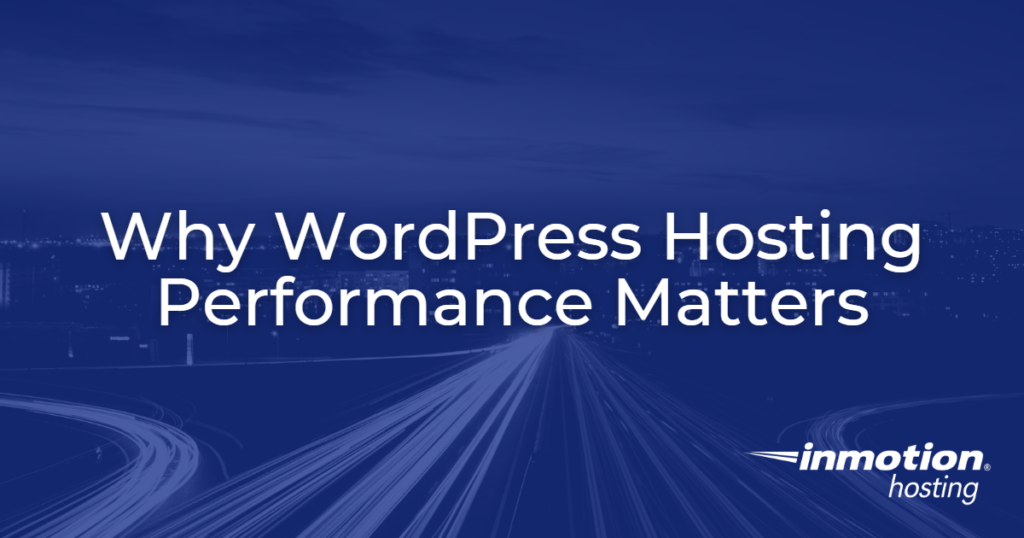
WordPress hosting performance matters for your business. At what point do you click away when a site is slow to load? Studies have shown that one in four will leave a web page if it takes longer than four seconds. Half will leave if the financial transaction pages (cart, payment page, etc.) take two seconds or more to load. So why does hosting performance matter?
Why WordPress Hosting Performance Matters
First Impressions are Lasting Impressions
All visitors to your site will create an instant judgment about you and your business the moment they look at your site. A quick load time will go far in building trust with your site visitors. Fast websites are instinctively considered to be more professional and reliable. Slow websites, on the other hand, appear unsafe and insecure. That negative first impression will keep their wallets and minds closed, costing you return visitors and customers.
Speed is Essential
This goes for mobile and desktop browsers. As a matter of fact, according to a study conducted by Kissmetrics.com, 85% of internet users expect a mobile site to load as fast or faster than on their desktop. Your website should be fast and mobile responsive.
User Experiences
A positive user experience can be summed up in two ways: give visitors what they’re looking for and do it fast. You want a simple and easy to navigate user experience that sets you apart from the competition. Your WordPress hosting performance is key to that success.
Conversions Need Speed
Slow load speed drives customers away. So let’s look at the stats earlier. If half of your customers leave if the e-commerce area of your site takes more than two seconds to load, the results are obvious. Slow speed will drive your sales away.
Loss of Referrals
If your site continues to be a problem, people will stop referring it to others. Established websites will be less likely to link to your site because of their poor visitor experience. Remember that slow site speeds can affect the trust value. Losing credibility is detrimental to your business.
Google Rank
Slow speeds affect your Google rank. This means that faster websites will take precedence over slower ones when it comes to page ranking. Speed isn’t as important as authority and relevance, but it will send fewer crawlers to your site if your server is slower than two seconds. Fewer crawlers mean less information gathered. Less information gathered means less SEO connection with Google searches.
Know Your Speed
Now that you know why WordPress hosting performance is key to your success, it’s time to tackle the next step. Use a loading speed test tool such as WebPagetest or Pingdom to check your page loading performance. Also look at your hosting error log to see the errors your site has accumulated. If you haven’t enabled your error log, you should. Take note of server errors and internal database errors. Those are likely related to your hosting package, but you can always talk with your hosting service provider and their technical support to be sure.
If your hosting package isn’t the problem, you can also look at your WordPress installation. Search for bloated themes or resource intensive plugins. Also, multiple people working in the back end of your site all at once can have a detrimental effect on your load times. Read a resource we recently released about cleaning your WordPress website.
There is no doubt that WordPress hosting performance makes an impact on your business. Your customers want to know that your site is reliable, and we want to help you make that happen. If you are curious about WordPress hosting options, chat with one of our WordPress Hosting experts to learn more.
I’ve been getting a lot of new users signing onto my WordPress site, often using a name that begins with “test”. I haven’t seen this before and have no way on my site for new users to sign on. Are these new users something legitimate or should I be worried?
Hello Jim – Thanks for the question about your test users. I would first make sure it’s not your own staff (if you have staff) that are making test users on your website. If not, then you will need to decide on a policy for that. Anonymous users may not always be disruptive, but when issues occur on the site that requires registration and you don’t have a good confirmed list of users, then it’s possible that it could be problematic. Keep in mind that although people can register with “test”, they can also register with a more legitimate-looking name that is based on a fake or temporary email account. So, it’s really the actions of these users that should determine their continued existence on your site. My recommendation is that if you’re worried, then you state on your sign-up page that “test” or “anonymous” accounts will be removed after a period of time.
You should also incorporate a reCaptcha (e.g. https://wordpress.org/plugins/login-security-recaptcha/) to help weed out any possible robots. You can also employ reCaptcha’s on your registration page which will help to determine automated attempts of logging into your site.
Finally, registration can often be a necessary step for your online presence. Making the registration process clear and up-front may also help to deter any misunderstanding. This is a good guide for creating user-friendly user registration processes: https://blog.hubspot.com/blog/tabid/6307/bid/31517/12-ways-to-create-a-user-friendly-website-registration-process.aspx.